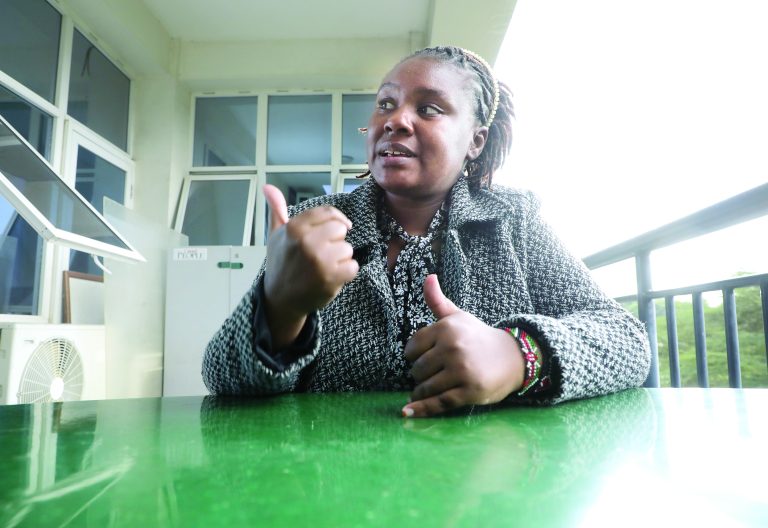Woman’s lonesome path to be professional counsellor

The youths are redefining narratives, in a world that often waits for people to grow old before they’re taken seriously, they are increasingly showing that sometimes, wisdom comes not from age, but from listening, showing up, and loving others through their pain.
A soft-spoken 26-year-old woman is quietly rewriting the narrative of youth, resilience, and mental health care in Kenya. Eunice Magoma Achoki, counsellor, entrepreneur, and herself a survivor, has made it her mission to offer therapy with a human touch, drawn from the wounds of her own life.
Born in the densely populated Kawangware area and raised in Ongata Rongai, Magoma’s early years were anything but calm.
“When I was in high school, I underwent a lot of trauma. I was a very rebellious child because my parents were going through a separation,” Magoma recalls.
It was a counsellor’s compassion that sparked Eunice’s lifelong mission to be for others what that counsellor had been for her.
“My dad got me a counsellor, and that woman really helped me. I watched that woman try to help me, and I said I want to do what that woman was doing for me. Since it is a noble profession,” she adds.
Defining moments
At a time when many youth are still navigating their identity, Magoma was already choosing a purpose. After finishing high school at Moi Girls Nairobi, she earned her degree in Counselling Psychology from Moi University, and now she has enrolled at Kenya Medical Training College (KMTC) for a Higher Diploma in Addiction Science. But she’s not stopping there.
“I don’t think I’m skilled enough not yet, for you to be a counsellor, you need to have experience with life,” she says with a humility that’s rare.
Don’t misread her humility for inexperience, though.
Magoma has spent over 100 hours counselling at Nairobi Hospital, grappling with trauma that would leave most broken. She recalls, voice cracking only slightly, a moment that marked her forever.
“There was a one-year-old baby with an inoperable brain tumour. We had to prepare the parents to say goodbye. It was so hard. You go home and wonder, What did I do to deserve good health?”
The emotional weight of such moments isn’t easily shaken.
Like many youths, Magoma has faced the brutal reality of getting employment in Kenya’s job market, despite one’s qualifications. Eunice is brutally honest about her limitations.
“Getting a job in Kenya is very hard; they want five years’ experience, and you are just from the university, and they want you to have experience that you don’t have,” she says.
Yet in a country where therapy is still often stigmatised, Magoma saw a gap in the counselling profession, filled it and created her own opportunity; a teletherapy platform she founded to reach those suffering in silence.
“I didn’t have an office, but I had my phone. That was enough,” she explains.
From addiction to loneliness, grief to depression, Magoma listens, counsels and guides, often using church space or outsourcing venues for in-person sessions.
What she offers is more than therapy; it’s companionship in the darkness.
Out here, people don’t just need advice. They need to be seen, heard, and understood. Her work is not without cost.
“Being a counsellor is like carrying other people’s burdens,” she says, “Sometimes, you’re the last person a dying patient talks to. And you go home wondering if you did enough. Did you give hope, even where there was none?”
To cope, Magoma journals, walks, and finds solace in her faith and her one closest friend- also a counsellor.
“You need someone who understands what it means to be you. Because when people know you’re a therapist, all they see is a solution. They forget you’re human too,” she explains.
Silent battles
One of the most challenging parts of her work is dealing with family trauma. Magoma recalls a young woman, recently turned 18, seeking escape from an abusive mother.
“Emotional abuse is hard to prove. Parents deny everything. You have to teach the child how to survive, how to cope, until they can leave,” she says.
Her observations paint a broader picture of modern Kenyan society: the rise of addiction, the loneliness of urban life, and the silent mental battles people fight daily.
“I think we’re heading into a crisis. In five to ten years, addiction will be a major public health issue. That’s why I want to specialise in rehabilitation,” she warns.
It’s not a glamorous dream; it’s a needed one, and perhaps that’s what makes Magoma’s story so compelling, not just the trauma she’s witnessed, but her unwavering decision to stay with people in their darkest moments, despite her own fears and fragility.
In a profession often associated with seasoned elders, Magoma stands out not because she knows everything, but because she’s brave enough to admit she doesn’t.
“You learn every day, and that’s okay,” she says.











